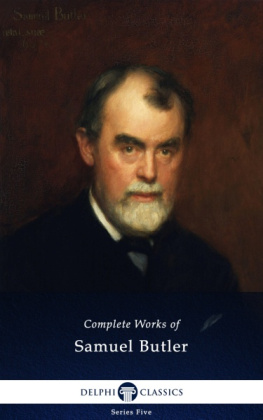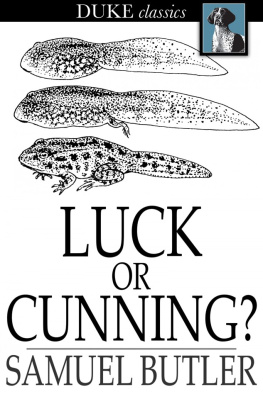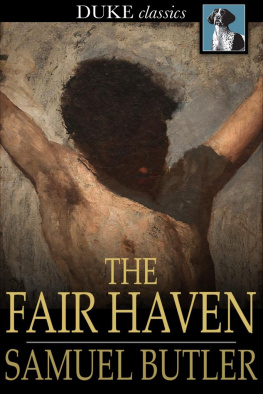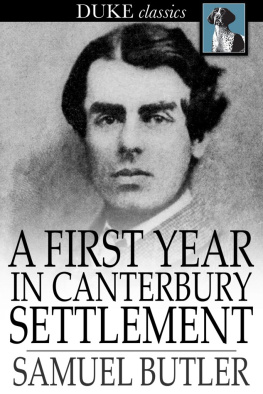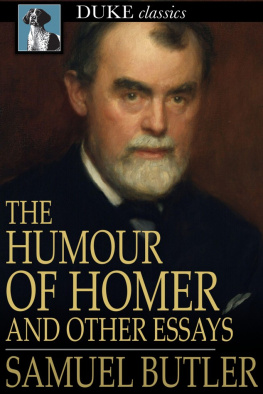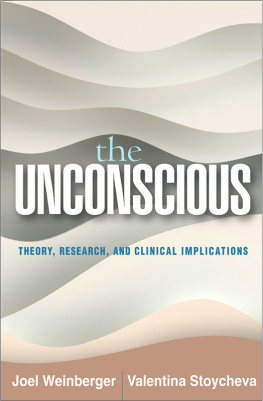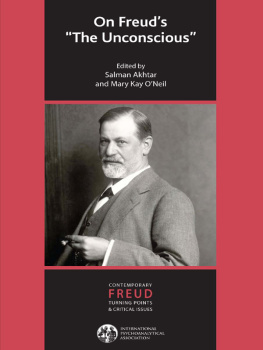Samuel Butler - Unconscious Memory
Here you can read online Samuel Butler - Unconscious Memory full text of the book (entire story) in english for free. Download pdf and epub, get meaning, cover and reviews about this ebook. year: 2011, publisher: Barnes & Noble, genre: Science. Description of the work, (preface) as well as reviews are available. Best literature library LitArk.com created for fans of good reading and offers a wide selection of genres:
Romance novel
Science fiction
Adventure
Detective
Science
History
Home and family
Prose
Art
Politics
Computer
Non-fiction
Religion
Business
Children
Humor
Choose a favorite category and find really read worthwhile books. Enjoy immersion in the world of imagination, feel the emotions of the characters or learn something new for yourself, make an fascinating discovery.
- Book:Unconscious Memory
- Author:
- Publisher:Barnes & Noble
- Genre:
- Year:2011
- Rating:3 / 5
- Favourites:Add to favourites
- Your mark:
- 60
- 1
- 2
- 3
- 4
- 5
Unconscious Memory: summary, description and annotation
We offer to read an annotation, description, summary or preface (depends on what the author of the book "Unconscious Memory" wrote himself). If you haven't found the necessary information about the book — write in the comments, we will try to find it.
The only thing of which I am sure is, that the distinction between the organic and inorganic is arbitrary. So writes Samuel Butler is his work of biological philosophy, Unconscious Memory, where he presents his theories of the mind through the lens of his criticism of established scientific ideas.
Unconscious Memory — read online for free the complete book (whole text) full work
Below is the text of the book, divided by pages. System saving the place of the last page read, allows you to conveniently read the book "Unconscious Memory" online for free, without having to search again every time where you left off. Put a bookmark, and you can go to the page where you finished reading at any time.
Font size:
Interval:
Bookmark:
SAMUEL BUTLER

This 2011 edition published by Barnes & Noble, Inc.
All rights reserved. No part of this publication may be reproduced, stored in a retrieval system, or transmitted, in any form or by any means, electronic, mechanical, photocopying, recording, or otherwise, without prior written permission from the publisher.
Barnes & Noble, Inc.
122 Fifth Avenue
New York, NY 10011
ISBN: 978-1-4114-3960-3
Introduction
By Marcus Hartog, M.A., D.Sc., F.L.S., F.R.H.S.
IN reviewing Samuel Butler's works, "Unconscious Memory" gives us an invaluable lead; for it tells us (Chaps. II, III) how the author came to write the Book of the Machines in "Erewhon" (1872), with its foreshadowing of the later theory, "Life and Habit" (1878), "Evolution, Old and New" (1879), as well as "Unconscious Memory" (1880) itself. His fourth book on biological theory was "Luck, or Cunning?" (1887).
Besides these books, his contributions to biology comprise several essays: "Remarks on Romanes' Mental Evolution in Animals," contained in "Selections from Previous Works" (1884) incorporated into "Luck, or Cunning?"; "The Deadlock in Darwinism" (Universal Review, April-June 1890), republished in the posthumous volume of "Essays on Life, Art, and Science" (1904); and, finally, some of the "Extracts from the Notebooks of the late Samuel Butler," edited by Mr. H. Festing Jones, now in course of publication in the New Quarterly Review.
Of all these, "LIFE AND HABIT" (1878) is the most important, the main building to which the other writings are buttresses or, at most, annexes. Its teaching has been summarised in "Unconscious Memory" in four main principles: "(1) the oneness of personality between parent and offspring; (2) memory on the part of the offspring of certain actions which it did when in the persons of its forefathers; (3) the latency of that memory until it is rekindled by a recurrence of the associated ideas; (4) the unconsciousness with which habitual actions come to be performed." To these we must add a fifth: the purposiveness of the actions of living beings, as of the machines which they make or select.
Butler tells ("Life and Habit," p. 33) that he sometimes hoped "that this book would be regarded as a valuable adjunct to Darwinism." He was bitterly disappointed in the event, for the book, as a whole, was received by professional biologists as a gigantic jokea joke, moreover, not in the best possible taste. True, its central ideas, largely those of Lamarck, had been presented by Hering in 1870 (as Butler found shortly after his publication); they had been favourably received, developed by Haeckel, expounded and praised by Ray Lankester. Coming from Butler, they met with contumely, even from such men as Romanes, who, as Butler had no difficulty in proving, were unconsciously inspired by the same ideasNur mit ein bischen ander'n Wrter.
It is easy, looking back, to see why "Life and Habit" so missed its mark. Charles Darwin's presentation of the evolution theory had, for the first time, rendered it possible for a "sound naturalist" to accept the doctrine of common descent with divergence; and so given a real meaning to the term "natural relationship," which had forced itself upon the older naturalists, despite their belief in special and independent creations. The immediate aim of the naturalists of the day was now to fill up the gaps in their knowledge, so as to strengthen the fabric of a unified biology. For this purpose they found their actual scientific equipment so inadequate that they were fully occupied in inventing fresh technique, and working therewith at factssave a few critics, such as St. George Mivart, who was regarded as negligible, since he evidently held a brief for a party standing outside the scientific world.
Butler introduced himself as what we now call "The Man in the Street," far too bare of scientific clothing to satisfy the Mrs. Grundy of the domain: lacking all recognised tools of science and all sense of the difficulties in his way, he proceeded to tackle the problems of science with little save the deft pen of the literary expert in his hand. His very failure to appreciate the difficulties gave greater power to his workmuch as Tartarin of Tarascon ascended the Jungfrau and faced successfully all dangers of Alpine travel, so long as he believed them to be the mere "blagues de rclame" of the wily Swiss host. His brilliant qualities of style and irony themselves told heavily against him. Was he not already known for having written the most trenchant satire that had appeared since "Gulliver's Travels"? Had he not sneered therein at the very foundations of society, and followed up its success by a pseudo-biography that had taken in the "Record" and the "Rock"? In "Life and Habit," at the very start, he goes out of his way to heap scorn at the respected names of Marcus Aurelius, Lord Bacon, Goethe, Arnold of Rugby, and Dr. W. B. Carpenter. He expressed the lowest opinion of the Fellows of the Royal Society. To him the professional man of science, with self-conscious knowledge for his ideal and aim, was a medicine-man, priest, auguruseful, perhaps, in his way, but to be carefully watched by all who value freedom of thought and person, lest with opportunity he develop into a persecutor of the worst type. Not content with blackguarding the audience to whom his work should most appeal, he went on to depreciate that work itself and its author in his finest vein of irony. Having argued that our best and highest knowledge is that of whose possession we are most ignorant, he proceeds: "Above all, let no unwary reader do me the injustice of believing in me. In that I write at all I am among the damned."
His writing of "EVOLUTION, OLD AND NEW" (1879) was due to his conviction that scant justice had been done by Charles Darwin and Alfred Wallace and their admirers to the pioneering work of Buffon, Erasmus Darwin, and Lamarck. To repair this he gives a brilliant exposition of what seemed to him the most valuable portion of their teachings on evolution. His analysis of Buffon's true meaning, veiled by the reticences due to the conditions under which he wrote, is as masterly as the English in which he develops it. His sense of wounded justice explains the vigorous polemic which here, as in all his later writings, he carries to the extreme.
As a matter of fact, he never realised Charles Darwin's utter lack of sympathetic understanding of the work of his French precursors, let alone his own grandfather, Erasmus. Yet this practical ignorance, which to Butler was so strange as to transcend belief, was altogether genuine, and easy to realise when we recall the position of Natural Science in the early thirties in Darwin's student days at Cambridge, and for a decade or two later. Catastropharianism was the tenet of the day: to the last it commended itself to his Professors of Botany and Geology, for whom Darwin held the fervent allegiance of the Indian scholar, or chela, to his guru. As Geikie has recently pointed out, it was only later, when Lyell had shown that the breaks in the succession of the rocks were only partial and local, without involving the universal catastrophes that destroyed all life and rendered fresh creations thereof necessary, that any general acceptance of a descent theory could be expected. We may be very sure that Darwin must have received many solemn warnings against the dangerous speculations of the "French Revolutionary School." He himself was far too busy at the time with the reception and assimilation of new facts to be awake to the deeper interest of far-reaching theories.
It is the more unfortunate that Butler's lack of appreciation on these points should have led to the enormous proportion of bitter personal controversy that we find in the remainder of his biological writings. Possibly, as suggested by George Bernard Shaw, his acquaintance and admirer, he was also swayed by philosophical resentment at that banishment of mind from the organic universe, which was generally thought to have been achieved by Charles Darwin's theory. Still, we must remember that this mindless view is not implicit in Charles Darwin's presentment of his own theory, nor was it accepted by him as it has been by so many of his professed disciples.
Font size:
Interval:
Bookmark:
Similar books «Unconscious Memory»
Look at similar books to Unconscious Memory. We have selected literature similar in name and meaning in the hope of providing readers with more options to find new, interesting, not yet read works.
Discussion, reviews of the book Unconscious Memory and just readers' own opinions. Leave your comments, write what you think about the work, its meaning or the main characters. Specify what exactly you liked and what you didn't like, and why you think so.


